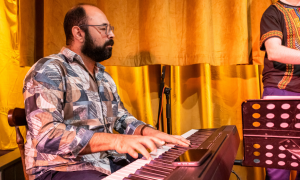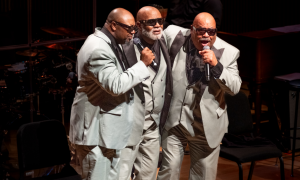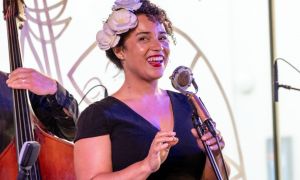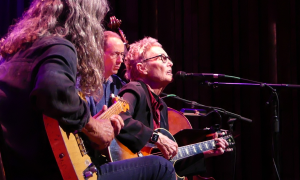Home » Jazz Articles » Live Review » Enjoy Jazz 2018
Enjoy Jazz 2018

Heidelberg/Mannheim/Ludwigshafen
October 13-15, 2018
During fall Enjoy Jazz is a major well-established event running through the metropolitan Rhine-Neckar-region (2, 4 million inhabitants) in southwestern Germany, now in its 20th year. Unlike the fast-forward conveyor belt of musical acts at many jazz festivals, whizzing past in a few crammed days,' Enjoy Jazz stretches over a period of six weeks in October and November. It means that there are never more than two or three concerts every day. It entails a complex network of local and regional cooperation. Each concert is special, and can be enjoyed and celebrated in its own right. This set-up clearly entails a different way of making choices and experiencing music, which has consequences for the programming too. Generally speaking the festival is characterized by a splendid diversity of coexisting facets of directions in jazz and neighboring kinds of music. Enjoy Jazz rests on a coalition of people from different societal areas that not only share a strong conviction that creativity, arts and culture are key factors for the productivity, stability and innovative potential of society but also distinguish themselves by their readiness to act on it.
Into the new century: 20 years of Enjoy Jazz
The festival, spread widely across the region, started in 1999 with 14 concerts in Heidelberg's Karlstorbahnhof venue just a year before the transition to a new millenium. Now, in its 20th year, it is a fully integrated and embraced institution in the three neighboring cities of Heidelberg on the river Neckar, Mannheim on the river Rhine and Ludwigshafen on the other side of the Rhine River. Heidelberg and Mannheim are both part of the federal state Baden WЁ№rttemberg while Ludwigshafen is part of the federal state Rhineland-Palatia. Politically both federal states are different from most other federal states and the central state. Baden-WЁ№rttemberg has a government lead by the Green Party (in a coalition with the Christian Democrats) while Rhineland-Palatia has a government led by the Social Democrats (in a coalition with Green Party and the Liberal Democrats). That means that the Green Party is the strongest political force in the region. There you find a firm local/regional identity combined with an open cosmopolitan mentality. The Ministry of Culture of Baden WЁ№rttemberg has considerably expanded its jazz funding, especially for festivals.During the past 20 years, under festival director Rainer Kern and the financial management of Christian Weiss, there have been memorable moments, extraordinary performances and recordings, including

Ornette Coleman
saxophone, alto1930 - 2015

Joshua Redman
saxophoneb.1969

Brad Mehldau
pianob.1970

Charlie Haden
bass, acoustic1937 - 2014
This year

Archie Shepp
saxophone, tenorb.1937

Yusef Lateef
woodwinds1920 - 2013

Reggie Workman
bassb.1937

Mulgrew Miller
piano1955 - 2013

Hamid Drake
drumsb.1955
Kinds of waves
This article covers three days with five concerts from the six-weeks stretch. These days went from dancing fingers to cathartic arches and from there to screaming seagulls rushing down to pass John Coltrane's music and then turning to a voluminous Big Band ride. Musicians involved were, among others: Ross Daly, Yurdal Tokcan,
Anja Lechner
cello
Alexandra Lehmler
saxophone, alto
Michal Miskiewicz
drums
Sebastian Gille
saxophone
Elias Stemeseder
synthesizerb.1990
Robert Landfermann
bass, acoustic
Jim Black
drumsDancing fingers
I started at a concert belonging to the celebration of 10 years Oriental Academy of Music Mannheim (OMM) called 'Lauten der Welt' (world's lutes). It was also an element of the current Silk Road program of Museum Zeughaus, a good example of the way the festival is integrated in the diverse (interdisciplinary) aspects of the city and makes use of the local artistic and creative potentials. OMM is also a good example of the care for music migrants brought to the city and for its development in intercultural perspective. It started with three performances, the first " data-original-title="" title="">Johannes Vogt, theorbo, and Abbas Mashayekh, ?d, followed by Turkish ?d master Yurdal Tokcan and then rounded up by oriental strings legend Ross Daly from Crete. Both Daly and Tokcan had an important role in the teaching of the academy.The artful play with crossfading and confluence was a common characteristic of all three performances. Vogt and Mashayekh combined pieces from European baroque music (among others, Bach) with pieces from different kinds of music from Iran in a fine balance of subtle contrasts and confluence. Tokcan and Daly intensified it both in their own way. Tokcan's ?d playing was amazingly delicate and virtuosic, with almost hyper natural dynamics. Listening with eyes shut it was hard to believe that the music is coming from just one instrument. With eyes open it was amazing how his fingers danced on the strings of the instrument with velocity, variation of pressure, slides, dynamical contrasts and rhythmical sophistication causing the subtlest orchestral sounds. He intensified the emotional load of the instrument's sound in deeply touching ways. His virtuosic playing always was in service of grounding expression, a precious experience. Ross Daly played the three-string Cretan lyraki—a bowed instrument with a (very) short neck (and fingerboard) that—due to the manner of touching and pressing the strings -gives an ethereal sound. It is said that it was Ulysses' conjuring instrument. Confluence and overlaying is even more important here to enhance and extend the instrument's otherworldly sound, give it an enduring ascending and transcending quality. Daly accomplished that fully submerged, with great beauty. While Tokcan worked more inwards with his instrument, Daly projected the sound of his instrument spaciously outwards.
It turned out to be a prodigious lead-in to the night concert in the grand gothic Heiliggeistkirche (Church of the Holy Spirit) in the center of neighboring Heidelberg by German cellist Anja Lechner and Argentinian guitarist Pablo MЁўrquez. The duo played a purely acoustic concert in the large church. It evolved and turned out to be an equally dynamic and enchanting affair as the concert before, and, in essence, a natural extension of the magical dancing fingers scenario before. Lechner has reached a level of essential 'klang,' breathing flow, grounded grace and freedom that allowed her to be present in a strong and at the same time unfettered way. The quality of her dark tones in the lower register was especially extraordinary. Her playing included the audience from the very beginning on in a stringent as well as generous way. Pablo MЁўrquez appeared as a character intimately connected with his 'little' acoustic guitar and clearly enjoying his subtle underpinning, subdued enlightening, carefully interweaving role. His phrasing and timing were impressive; the tonal variation of his soloing was amazing. The duo's dynamics, the transitions between gliding tones and rhythmical intensity through the changing moods were captivating.
It is a special experience to attend a concert without knowing the program, without knowing what will be played and what is played—as in this case. It is—without doubt -a different kind of listening experience. It soon became apparent that the music had a very familiar character. Certain well-known pieces became recognizable gradually with plenty of highly enjoyable surprise moments and an intimate and very direct Schubert-like feeling: "Der Leiermann" of course, but also "N?chte und Tr?ume," "Allegro Moderato," "Meeres Stille," all moods and melodies which are burned into our memory, knowingly or not, from the original pieces or its numerous echoes and adaptions. It felt like a fictitious intimate rendition by Franz Schubert himself at a nightly hour playing his music, a real re-framing of and departure from the usual known klangbild (sound impression) with piano. It turned out to be an intense, satisfying experience. After the concert I learned that it was a live premiere of a new album by Lechner and Marquez called Die Nacht that will be released in November on ECM. As an encore Lechner and MЁўrquez presented a piece by Carlos Guastavino (1912-2000), the Schubert of the Pampas, that opened a wider horizon with its subtle differential folk tinge.
Actually Schubert wrote only one piece for guitar and voices (Terzetto, D.80) and a Sonata A minor (D.821 ) for Arpeggione, a bowed guitar, and piano. There are claims that Schubert was playing guitar and used it to compose and perform works of his own but the evidence for these claims is weak.
Close cathartic connection
The Polish Simple Acoustic Trio of pianist Marcin Wasilewski, bassist S?awomir Kurkiewicz and drummer Michal Mi?kiewicz, still young but together now already for 25 years, is a familiar guest for the festival, especially through its long-time collaboration with Polish trumpet-legend
Tomasz StaЁҪko
trumpet1942 - 2018
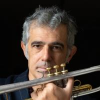
Paolo Fresu
trumpetb.1961
The trio serves and fulfills the key characteristics of the piano trio, the singing of the song and the combining and melting together of a diversity of song material in a fascinating way. The three musicians carry it to a yet higher place by a special intensity in its performances that reached an extra high level in their Ludwigshafen concert. Every piece had a great cathartic tension arc built up every time in a wonderful way, freshly flowing and burning, no dull moment, no leaning back, no vain notes. And, as a consequence, an amazingly high immersion of the audience could be sensed that embraced and absorbed the musical offering and its tension eagerly. Clearly perceptible breathing, tensed surprise and the wave of cathartic relief at the end of EVERY piece was evidence of this extraordinary quality.
Screaming seagulls, plopping walruses
Monday, October 15th, posed a difficult decision to make between the concert of the duo of pianist
Aruán Ortiz
pianob.1973

Don Byron
clarinetb.1958
The annual SWR Jazzpreis, jointly awarded by SWR radio and the federal state of Rhineland-Palatinate, is a prestigious award of venerable tradition dating back to 1981 when renowned jazz instigator Joachim E. Behrendt (1922-2000) was head of the jazz department of SЁ№dwestfunk radio in Baden-Baden (1947-1987) in the federal state of Baden-WЁ№rttemberg. SWR (SЁ№dwestrundfunk), a regional public radio station of the two federal states Baden-WЁ№rttemberg and Rhineland Palatinate, presently supplies 10 jazz programs every week. The awardee is chosen by a jury under the chairmanship of the head of the radio's jazz department. Sebastian Gille follows drummer

Christian Lillinger
drumsb.1984

Julia Hulsmann
pianob.1968
I wrote about Gille on the occasion of this year's Cologne Open meeting and his appearance there with a new trio: "Trio Aurora, comprising pianist
Lucas Leidinger
piano
Fabian Arends
drumsGille's voice clearly differs from the conventional hard blowing straight tenorist's voice. He developed his very own, idiosyncratic sound from the bordering zones or the inter-zones, the musical potentials of which especially famous German composer Helmut Lachenmann (1935) discovered and exploited for string instruments: the grain of bow-hair on string, and the areas of sounds in the space between pitch-free noise and the beginnings of the sound of a recognizable note.
Gille went into the inter-zone to make it attainable to his expressive needs and its intensification. It is a highly compressed sound that allows special tone bending, tormented lamenting qualities, and incisive yells, a question of pressure, tension and release. It resulted in an intriguing mixture of fragmentation and flow, yelps, and melodic lines. Especially in the second set it yielded passages of moonstruck trance, chiaroscuro effects, melodic lugubriousness and even grooving passages. It all triggered and stimulated the listener's imagination. At a certain moment I imagined myself in a Clint Eastwood Western universe with circling vultures. Another association was the sounds of a scenery with plopping and puffing walruses together with screaming seagulls rushing down.
The first set with young up-and-coming musician guitarist Luca Aaron from Berlin (a.o. This is Not My Dog, Minua) and Jim Black had a great coherence and surprisingly impressive musical quality, especially through young guitarist Luca Aaron's contribution. Watch out, we will see and hear more from him! The music of both line-ups came across convincingly and highly promising for further work to come.
Big sounds from the school banks
Sunday afternoon presented young musicians of three regional secondary school Big Bands united in one big Big Band, including various vocalists. The participating schools were St. Raphael Gymnasium from Heidelberg, Johann-Sebastian-Bach-Gymnasium from Mannheim and Max-Planck-Gymnasium from Ludwigshafen. The seventh gathering of this kind, supported by the BASF company, not only excelled with an extraordinary big sound, fine musical skills and dedication but also with an impressive selection of 12 pieces crossing through a wide area of popular music from classic jazz pieces to Heavy Metal rages. Among others pieces were Errol Garner ("Misty"), Amy Winehouse, Peggy Lee ("Fever"), Jackson 5 ("Ain't No Sunshine"), Hoagy Carmichael ("The Nearness of You"), Metallica, Guns and Roses ("Welcome To The Jungle"), Freddy Hubbard ("Red Clay"). Alternately conducted by the music teachers of the three participating schools, it turned out a highly dynamic set, full of joy and fully indulging in the reveling of sound (Klangschwelgen) peppered with a lot of short but powerful soloing. The big Enjoy Jazz Schulbigband finished with "Absolutely Digi " as encore, the funkiest piece rolling with rhythmic cascades Ёў la Sly Stone and a gorgeous baritone solo. Working with compact, colorful and feasible arrangements the directors, jointly and together with all these young musicians, achieved something brilliantly exemplary and highly motivating. The orchestra went like clockwork and it is quite an achievement to rehearse this very large ensemble. It is all evidence of a fertile soil for the festival and for the effects of mutual reinforcement. After seven years it is that strong that it might be time to take further-reaching steps. There's a nota bene left: too many of the young musicians and the vocalists were hidden behind a high barrier of music stands. It would be worthwhile to work with ascending pedestals or use electronic pads to improve the visual presentation.Reflection
As with many other festivals Enjoy Jazz has accompanying programs, whether introductory, complementary or reflective. One of these, a matinee program entitled "John Coltrane: Liberation or Burden?," was dedicated to saxophonist John Coltrane (1926-1967) on the occasion of a recent release of -again another -'lost tape' under the title Both Directions at Once. German music journalist Tobi MЁ№ller, a cultural journalist and author from Berlin, writing about pop and theater themes, documentary maker and playwright, went into a conversation with saxophonist Alexandra Lehmler from Mannheim about the phenomenon of John Coltrane based on music that Coltrane recorded in 1963 when he was 37 years old.It was a thoroughly prepared and excellently presented matter and went much deeper and further than most of the superficial, clichЁҰd dispute in the media about the issue. Coltrane was a late bloomer and in quite a short period of time a lot of things happened. MЁ№ller put that in perspective from the album's music as point of reference. Lehmler then talked in an illustrative way about the application of Coltrane's achievements and the value for her own music making. It was an illuminating and instructive session where MЁ№ller also succeeded in leading the audience into concentrated deep listening to longer stretches of Coltrane's music.
Ausblick
The festival is apparently stable and going strong. Even a short stretch of three days offered an interesting diversity, well embedded in a lively and meaningful context. Different from a lot of other festivals Enjoy Jazz is not an outsourced extraterritorial affair. It accompanies everyday life on a daily basis but it is much more than a series of good concerts at a local venue.Tags
Live Reviews
Henning Bolte
Germany
Mannheim
Ornette Coleman
Joshua Redman
brad mehldau
Charlie Haden
archie shepp
Yusef Lateef
Reggie Workman
Mulgrew Miller
Hamid Drake
Seb El Zin
Ross Daly
Yurdal Tokcan
Anja Lechner
Pabo MЁўrquez
Alexandra Lehmler
Marcin Wasilweski
Slawomir Kurjkiewicz
Michal Miskiewicz
Sebastian Gille
Luca Aaron
Elias Stemeseder
Robert Landfermann
Jim Black
Johannes Vogt
Abbas Mashayekh
Franz Schubert
Carlos Guastavino
tomasz stanko
Paolo Fresu
Aruan Ortiz
Don Byron
Joachim E. Behrendt
Christian Lillinger
Julia Hulsmann
Lucas Leidinger
Fabian Arends
Helmut Lachenmann
Comments
PREVIOUS / NEXT
Support All About Jazz
 All About Jazz has been a pillar of jazz since 1995, championing it as an art form and, more importantly, supporting the musicians who make it. Our enduring commitment has made "AAJ" one of the most culturally important websites of its kind, read by hundreds of thousands of fans, musicians and industry figures every month.
All About Jazz has been a pillar of jazz since 1995, championing it as an art form and, more importantly, supporting the musicians who make it. Our enduring commitment has made "AAJ" one of the most culturally important websites of its kind, read by hundreds of thousands of fans, musicians and industry figures every month.
Go Ad Free!
To maintain our platform while developing new means to foster jazz discovery and connectivity, we need your help. You can become a sustaining member for as little as $20 and in return, we'll immediately hide those pesky ads plus provide access to future articles for a full year. This winning combination vastly improves your AAJ experience and allow us to vigorously build on the pioneering work we first started in 1995. So enjoy an ad-free AAJ experience and help us remain a positive beacon for jazz by making a donation today.

Mannheim
Concert Guide | Venue Guide | Local Businesses
| More...
Mannheim Concerts
Sep
19
Fri
Dirik Schilgen Jazzgrooves - Jazzhaus Hd
Jazzhaus Heidelberg
Heidelberg, Germany
Sep
26
Fri

Kristin Korb Trio: Eurythmics Vs. Jazz
BIX Jazzclub
Stuttgart, Germany
Sep
28
Sun

Diana Krall
Liederhalle
Stuttgart, Germany
Sep
28
Sun

Diana Krall
Beethoven Hall (beethovensaal)
Stuttgart, Germany
Sep
29
Mon

Kristin Korb Trio: Eurythmics Vs. Jazz
Ella & Louis
Mannheim, Germany
Oct
2
Thu

Ibrahim Maalouf
Basf-feierabendhaus
Ludwigshafen am Rhein, Germany
Oct
13
Mon

Diana Krall
Alte Oper
Frankfurt am Main, Germany
Oct
17
Fri

Rachel Eckroth Trio
BIX Jazzclub
Stuttgart, Germany
Oct
18
Sat

Al Di Meola
Festspielhaus Baden-baden
Baden-Baden, Germany
Oct
25
Sat
MYT @ Deutsches Jazzfestival
Hr-sendesaal
Frankfurt am Main, Germany

Mannheim
Concert Guide | Venue Guide | Local Businesses | More...
Sep
19
Fri
Dirik Schilgen Jazzgrooves - Jazzhaus Hd
Jazzhaus HeidelbergHeidelberg, Germany
Sep
26
Fri

Kristin Korb Trio: Eurythmics Vs. Jazz
BIX JazzclubStuttgart, Germany
Sep
28
Sun

Diana Krall
LiederhalleStuttgart, Germany
Sep
28
Sun

Diana Krall
Beethoven Hall (beethovensaal)Stuttgart, Germany
Sep
29
Mon

Kristin Korb Trio: Eurythmics Vs. Jazz
Ella & LouisMannheim, Germany
Oct
2
Thu

Ibrahim Maalouf
Basf-feierabendhausLudwigshafen am Rhein, Germany
Oct
13
Mon

Diana Krall
Alte OperFrankfurt am Main, Germany
Oct
17
Fri

Rachel Eckroth Trio
BIX JazzclubStuttgart, Germany
Oct
18
Sat

Al Di Meola
Festspielhaus Baden-badenBaden-Baden, Germany
Oct
25
Sat
MYT @ Deutsches Jazzfestival
Hr-sendesaalFrankfurt am Main, Germany





 Buy Now
Buy Now






